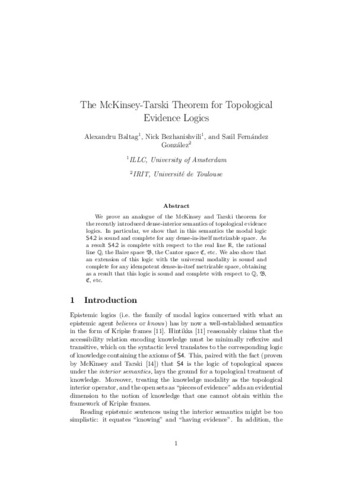The McKinsey-Tarski theorem for topological evidence logics
Autor(es) y otros:
Palabra(s) clave:
Logic
Dynamic Epistemic Logic
Fecha de publicación:
Versión del editor:
Citación:
Serie:
Lecture Notes in Computer Science (LNCS);11541
Resumen:
We prove an analogue of the McKinsey and Tarski theorem for the recently introduced dense-interior semantics of topological evidence logics. In particular, we show that in this semantics the modal logic S4.2 is sound and complete for any dense-in-itself metrizable space. As a result, S4.2 is complete with respect to the real line R, the rational line Q, the Baire space, the Cantor space, etc. We also show that an extension of this logic with the universal modality is sound and complete for any idempotent dense-in-itself metrizable space, obtaining as a result that this logic is sound and complete with respect to the aforementioned spaces.
We prove an analogue of the McKinsey and Tarski theorem for the recently introduced dense-interior semantics of topological evidence logics. In particular, we show that in this semantics the modal logic S4.2 is sound and complete for any dense-in-itself metrizable space. As a result, S4.2 is complete with respect to the real line R, the rational line Q, the Baire space, the Cantor space, etc. We also show that an extension of this logic with the universal modality is sound and complete for any idempotent dense-in-itself metrizable space, obtaining as a result that this logic is sound and complete with respect to the aforementioned spaces.
Descripción:
International Workshop, Logic, Language, Information, and Computation, WoLLIC (26th. 2019. Utrecht, The Netherlands)
ISBN:
Colecciones
Ficheros en el ítem




